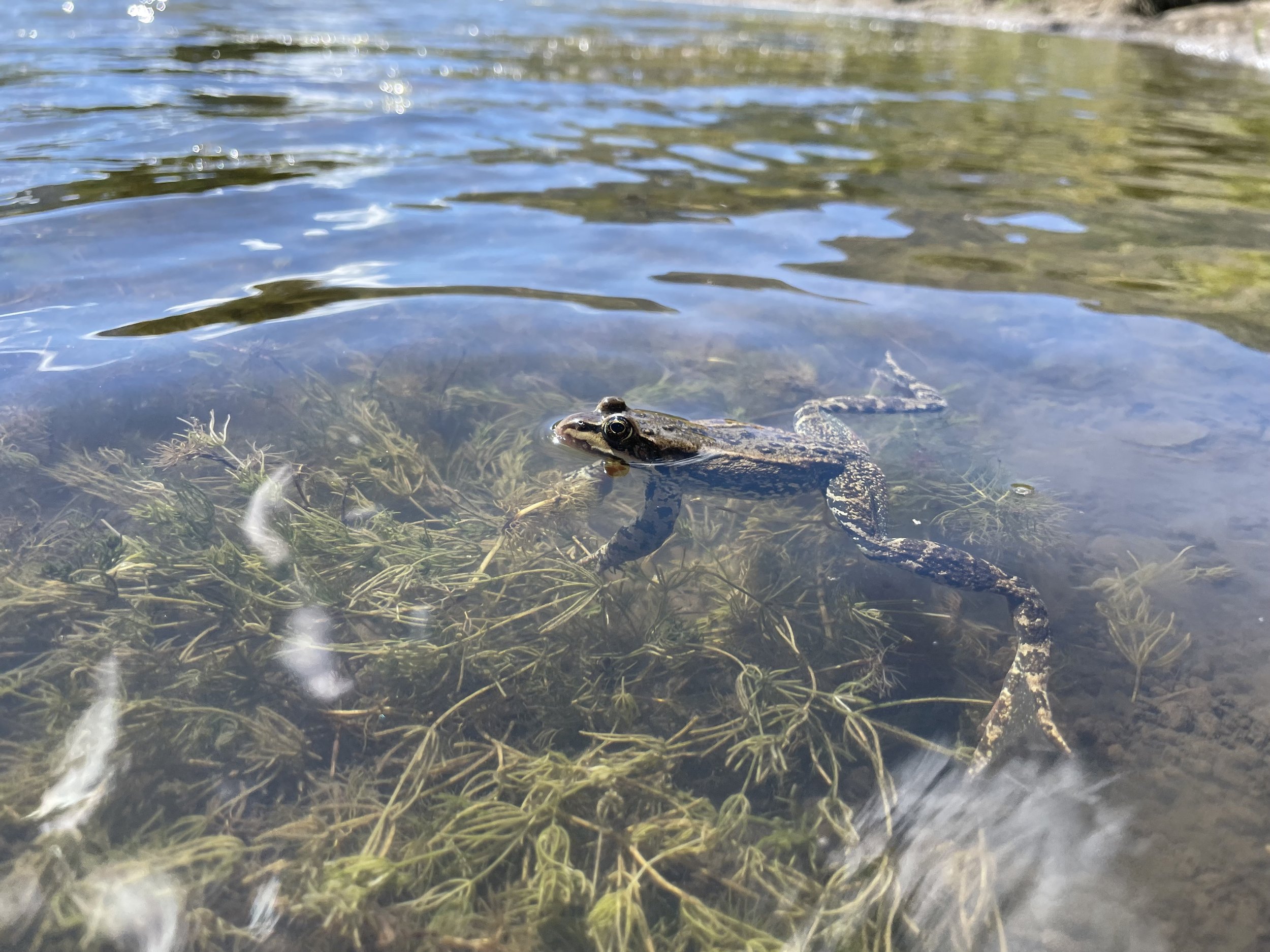
April Showers bring… April Flowers?!
Alberta is home to an impressive variety of flora and fauna. One of the fauna groups that often tends to get overlooked are amphibians. Amphibians are animals that have life stages that occur both aquatically and terrestrially. One of their most prominent features is their permeable skin that allows them to regulate moisture and gas exchange (breathing!). This awesome adaption also leaves them prone to impacts from pollution …

A Glimpse Into Marine Turtle Conservation: Shelling Out Some Love (and Facts!) for the Majestic Marine Turtle
It is winter here in Alberta, Canada and we are dreaming of warmer temperatures.
To turn the thermostat up a few notches, AJM’s Biologist, John Rich, transports us to the remote beaches of the Turkish Republic of Northern Cyprus in this latest post about his past work with endangered Marine Turtles!

The Cheesy 2021 AJM Family Christmas Letter
In case you missed it, here’s yet another cheesy Christmas letter from the AJM family to yours! We hope you all had a merry Christmas, are enjoying the rest of the holiday season and have a happy New Year!

What the Duck? Why Waterfowl are Essential to Wetlands
Wetlands provide vital habitat for an abundance of aquatic and terrestrial species, including, migratory waterfowl (ducks, geese, and swans).
Many of these important wetland ecosystems can be found nestled within the Prairie Pothole Region (PPR) of Alberta, Saskatchewan, and Manitoba in Canada, as well as North Dakota, South Dakota, Iowa, Minnesota, and Montana in the United States. So it almost doesn’t come as a surprise that the PPR provides suitable habitat for almost 50% of all North American migratory waterfowl populations to feed, breed, and stop-over during migration movements!

Ord's Kangaroo Rats - Alberta's Nocturnal Ninjas
Ord’s kangaroo rats are an amazing species, trust us, we could wax poetic for hours about their cute appearance and incredible adaptions. Instead, welcome to K-rat 101, an introduction to the wonderful world of Alberta’s nocturnal ninja. With no close relation to the invasive Norway rat, nor the leggy marsupials from Australia, the Ord’s kangaroo rat is part of a distinct group of rodents specially adapted to life in hot, arid environments.

Bull Trout Conservation - 'Tis the Season for Some Fish Squeeze'n!
For fisheries biologists, the month of September is an exciting one, as it marks the spawning season for many of Alberta’s Bull Trout populations. Bull Trout is Alberta's provincial fish and it is becoming a rare breed. Populations are considered "threatened" or of "special concern". Read AJM's latest blog to learn more about the species and how AJM is part of the BLTR conservation movement.

Snakes in the Grass
Alberta’s grasslands are an iconic eco-region and productive both agriculturally and industrially. These rangelands are home to some of Alberta’s most charismatic wildlife species like the burrowing owl, sharp-tailed grouse, pronghorn antelope, and the majority of our resident snake species. Snakes live the majority of their lives unseen and …

Why Didn’t the Fish Cross Under the Road?
Did you know that there are hundreds of thousands of watercourse crossings in Alberta? And did you know that many of them have the potential to negatively influence the ability of Alberta’s fish species to migrate between important habitats?

Hop to It: Working with Amphibians
Alberta is home to an impressive variety of flora and fauna. One of the fauna groups that often tends to get overlooked are amphibians. Amphibians are animals that have life stages that occur both aquatically and terrestrially. One of their most prominent features is their permeable skin that allows them to regulate moisture and gas exchange (breathing!). This awesome adaption also leaves them prone to impacts from pollution …

Let’s talk about mouse sperm: how the environment influences reproduction
As you may know, mice are some of the most studied animals in modern science. But did you know there’s a world of insight to be found in mouse testicles? AJM’s Environmental Scientist, Misha Lavoie, explains!

Why Did the Pipeline Cross the Wetland?
“That’s not a wetland, its dry!” For many people it may be hard to visualize wetlands in grassland ecosystems as they can be dry for most of the year. Although they may not be holding water during all months of the year, wetlands play an important role in mitigating floods and droughts by storing and slowly releasing water, as well as improving water quality by filtering out nutrients and contaminants.

A Benthic Bug's Life
All life depends on water. Monitoring the health of water bodies, such as streams and lakes, is extremely important to ensure we manage this vital resource effectively. We can assess aquatic communities with a suite of biological, chemical, and physical measurements to form a picture of overall aquatic health.

Drip, Drip... Who's There?
Invisible Genetic Codes in Streams and Lakes Reveal What Species are Present!

Your Eye in the Sky
Technology has changed the face of resource management and one tool in particular has gained popularity as a resource for visualizing diverse landscapes. Drones, also known as unmanned aerial vehicles (UAVs), are an incredible tool to capture both large and fine scale aerial imagery of anything from tracts of wilderness to large infrastructure projects.

Are You Unsure When to Submit to DFO Under the Fisheries Act?
Do you have a proposed development that is near an aquatic environment? Unsure whether you need to submit an application to DFO or not? AJM created this easy to follow Fisheries Act Decision Flow Chart to help guide you to make an informed decision.

Navigating the Revised Fisheries Act (2019)
The Government of Canada’s Bill C-68, an Act to amend the Fisheries Act received Royal Assent in July 2019. On August 28, 2019, the Fish and Fish Habitat Protection Program and its associated provisions came into force. The Fisheries Act is one of Canada’s oldest and most important environmental laws and was first enacted in 1868, one year after the Nation’s confederation!

Wetlands On Your Lease Site?
Wetlands play an important role in the watershed, acting as sponges by storing and slowly releasing water, and reducing the damaging effects of flooding and drought. They act as kidneys by filtering runoff and reducing the sediment load
